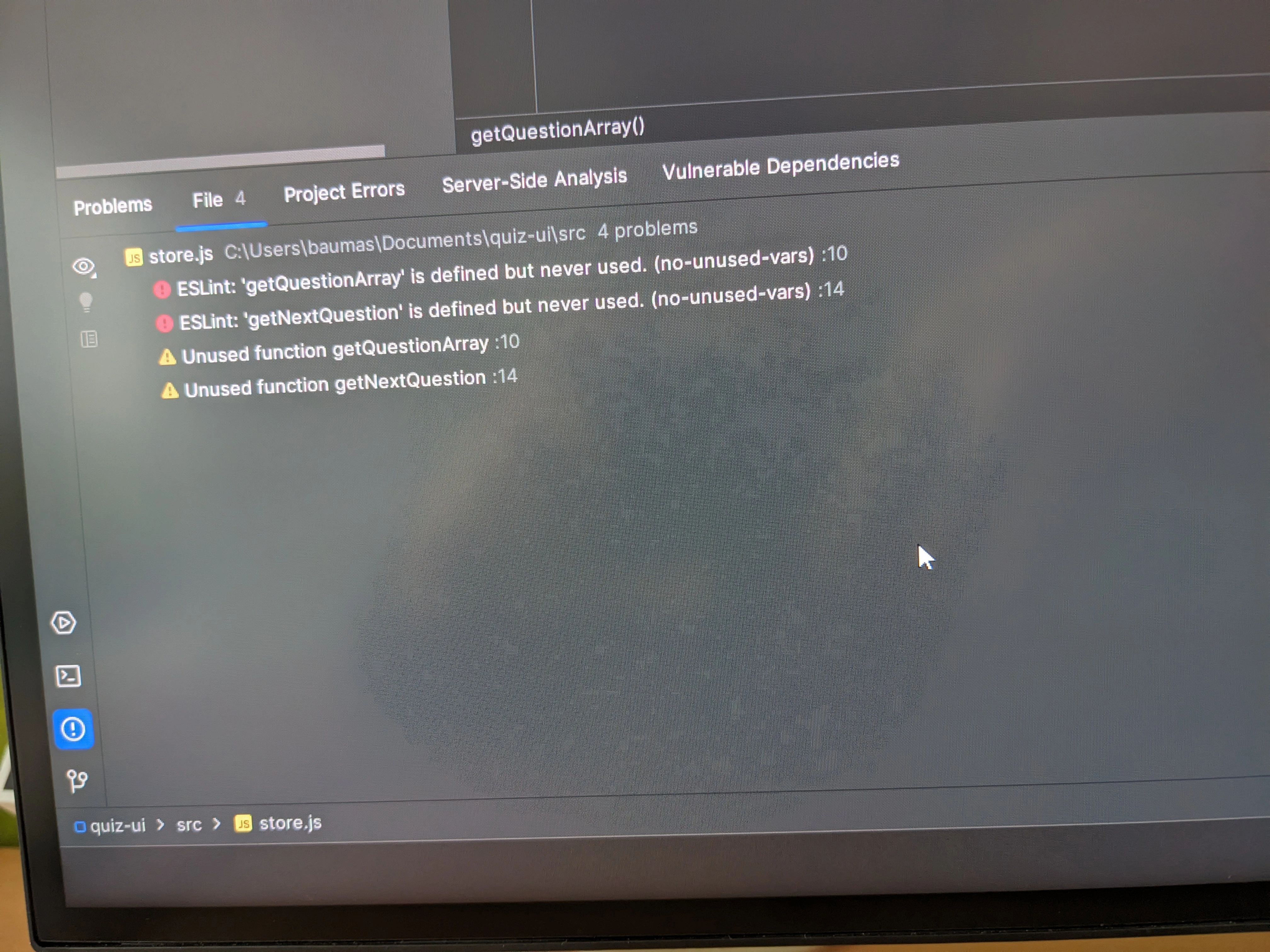Zig
I hate this in C++ when it does this with parameters of an overidden function. I don’t need that specific parameter, but if I omit the variable name, I reduce readability.
[[maybe_unused]]
Which is have been able to use since we switched to C++17 … a couple of months ago.
OP never said he/she commits such code but wants to iterate, test, explore.
Of course, unused var should not be part of a commit.
¯\_(ツ)_/¯
Isn’t it the same with ESLint 6 (JavaScript/ES6)?
I don’t believe so.

Are you sure?
(this is my work pc so wayyy to much work to make a screenshot and upload it)
That’s from ESLint, not javascript itself. JS doesn’t care about unused variables
JS simply does not care.
That’s why I said ESLint
ESLint won’t prevent you from running your code, which is what the OP is on about. Hence the confusion in this thread.
Oh it will. At least in combination with Vue. At least that’s the default. Of cause you can disable it.
You’re describing many things that are not JavaScript the language. If you create and use tools that will stop you then yes they will stop you.
You’re confusing it with your linter. Java script don’t care.
That’s why I said ESLint
It’s a Linter for JavaScript. Some people might not know what ESLint is that’s why I put it in brackets
Depends on your eslint config, but yeah that’s an option.
You go Go!
Its little called google language.
deleted by creator
As your future colleague wondering what the hell that variable is for, thanks Go.
Isnt the syntax highlighting it as mever used?
So why would they wonder?
If it is a pure value, I’d assume yes, but if it is tied to a side effect (E.g. write its value to a file), then it would be not used but still could break your app if removed.
I’m not familiar with rust language specifically, but generally that’s what could happen
A quick “find all references” will point out it’s not used and can be deleted if it accidentally gets checked in but ideally, you have systems in place to not let it get checked into the main branch in the first place.
You mean a system like the compiler
Or a linter. Or code reviews. Or anything else. The nice thing is that if the compiler doesn’t demand something, it can be given to the engineer as an option. The compiler should have the option to do it. The option could even be defaulted on. Afaik there is no way in Golang to disable that error (this is the line that does it: https://github.com/golang/go/blob/04fb929a5b7991ed0945d05ab8015c1721958d82/src/go/types/stmt.go#L67-L69). like --no-pedantics or such. Golang’s compiler openly refuses to give engineers more choices in what they think is the best system to handle it.
Who needs an option to leave unused variables around the code base? Lazybones?
You’ve literally never commented out a line or two but left the variable declaration while debugging?
Yeah any compiler should support environments or config files. Our CI would never work with without
--env “stage”Yeah that should be looked for in a CI line check, not a compilation requirement
Changing it will bring down the entire system.
We’ve spent ten million dollars and do not know why.
I prefer for it to be just a warning so I can debug without trouble, the build system will just prevent me from completing the pull request with it (and any other warning).
If only there was some way the compiler could detect unused variable declarations, and may be emit some sort of “warning”, which would be sort of like an “error”, but wouldn’t cause the build to fail, and could be treated as an error in CI pipelines
Let’s not pretend people acknowledge warnings, though. It’s a popular meme that projects will have hundreds of warnings and that devs will ignore them all.
There’s a perfectly valid use case for opinionated languages that don’t let you get away with that. It’s also similar to how go has gofmt to enforce a consistent formatting.
Honestly, I’ve been using Go for years and this unused variable error rarely comes up. When it does, it’s trivial to resolve. But the error has saved me from bugs more often than it has wasted my time. Most commonly when you declare a new variable in a narrower scope when you intended to assign to the variable of the same name (since Go has separate declare vs assign operators).
You can, if you want, opt into warnings causing your build to fail. This is commonly done in larger projects. If your merge request builds with warnings, it does not get merged.
In other words, it’s not a bad idea to want to flag unused variables and prevent them from ending up in source control. It’s a bad idea for the compiler to also pretend it’s a linter, and for this behaviour to be forced on, which ironically breaks the Unix philosophy principle of doing one thing and doing it well.
Mind you, this is an extremely minor pain point, but frankly this is like most Go design choices wherein the idea isn’t bad, but there exists a much better way to solve the problem.
Some people simply ignore warnings, that’s the main issue. Trust me, I saw this way too often.
If you cannot compile it than you have to fix it, otherwise just mark unused variables as ‘not an error’ via
_ = someunusedvar.
I wonder what portion of all go code written is
if err != nil {
return err
}
It’s gotta be at least 20%
Can anybody explain the rationale behind this?
deleted by creator
a desperate fear of modular code that provides sound and safe abstractions over common patterns. that the language failed to learn from Java and was eventually forced to add generics anyway - a lesson from 2004 - says everything worth saying about the language.
The language was designed to be as simple as possible, as to not confuse the developers at Google. I know this sounds like something I made up in bad faith, but it’s really not.
The key point here is our programmers are Googlers, they’re not researchers. They’re typically, fairly young, fresh out of school, probably learned Java, maybe learned C or C++, probably learned Python. They’re not capable of understanding a brilliant language but we want to use them to build good software. So, the language that we give them has to be easy for them to understand and easy to adopt. – Rob Pike
"It must be familiar, roughly C-like. Programmers working at Google are early in their careers and are most familiar with procedural languages, particularly from the C family. The need to get programmers productive quickly in a new language means that the language cannot be too radical. – Rob Pike
The infamous
if err != nilblocks are a consequence of building the language around tuples (as opposed to, say, sum types like in Rust) and treating errors as values like in C. Rob Pike attempts to explain why it’s not a big deal here.Exceptions don’t exists and ask errors must be handled at every level. It’s infuriating.
Hahaha, fuck no, I’ve dealt with exception-less code enough in my life, kthxbye
I think you missed a memo. Exceptions are bad and errors as values are in… I’ll have Harold forward it to you
I actually kind of like the error handling. Code should explain why something was a problem, not just where it was a problem. You get a huge string of “couldn’t foobar the baz: target baz was not greebleable: no greeble provider named fizzbuzz”, and while the strings are long as hell they are much better explanations for a problem than a stack trace is.
Swift and Rust have a far more elegant solution. Swift has a pseudo throw / try-catch, while Rust has a Result<> and if you want to throw it up the chain you can use a ? notation instead of cluttering the code with error checking.
The exception handling question mark, spelled
?and abbreviated and pronouncedeh?, is a half-arsed copy of monadic error handling. Rust devs really wanted the syntax without introducing HKTs, and admittedly you can’t dofoo()?.bar()?.baz()?in Haskell so it’s only theoretical purity which is half-arsed, not ergonomics.You can say it’s half-arsed if you like, but it’s still vastly more convenient to write than if err != nil all over the place
It’s not a half-arsed copy, it’s borrowing a limited subset of HKT for a language with very different goals. Haskell can afford a lot of luxuries that Rust can’t.
It’s a specialised syntax transformation that has nothing to do with HKTs, or the type system in general. Also HKTs aren’t off the table it’s just that their theory isn’t exactly trivial in face of the rest of Rust’s type system but we already have GATs.
It actually wouldn’t be hard writing a macro implementing do-notation that desugars to
and_thencalls on a particular type to get some kind of generic code (though of course monomorphised), but of course that would be circumventing the type system.Anyhow my point stands that how Rust currently does it is imitating all that Haskell goodness on a practical everyday coding level but without having (yet) to solve the hard problem of how to do it without special-cased syntax sugar. With proper monads we e.g. wouldn’t need to have separate syntax for
asyncand?
Note: Lemmy code blocks don’t play nice with some symbols, specifically < and & in the following code examples
This isn’t a language level issue really though, Haskell can be equally ergonomic.
The weird thing about
?.is that it’s actually overloaded, it can mean:- call a function on
A?that returnsB? - call a function on
A?that returnsB
you’d end up with
B?in either caseSay you have these functions
toInt :: String -> Maybe Int double :: Int -> Int isValid :: Int -> Maybe Intand you want to construct the following using these 3 functions
fn :: Maybe String -> Maybe Intin a Rust-type syntax, you’d call
str?.toInt()?.double()?.isValid()in Haskell you’d have two different operators here
str >>= toInt <&> double >>= isValidhowever you can define this type class
class Chainable f a b fb where (?.) :: f a -> (a -> fb) -> f b instance Functor f => Chainable f a b b where (?.) = (<&>) instance Monad m => Chainable m a b (m b) where (?.) = (>>=)and then get roughly the same syntax as rust without introducing a new language feature
str ?. toInt ?. double ?. isValidthough this is more general than just
Maybes (it works with any functor/monad), and maybe you wouldn’t want it to be. In that case you’d do thisclass Chainable a b fb where (?.) :: Maybe a -> (a -> fb) -> Maybe b instance Chainable a b b where (?.) = (<&>) instance Chainable a b (Maybe b) where (?.) = (>>=)restricting it to only maybes could also theoretically help type inference.
I was thinking along the lines of “you can’t easily get at the wrapped type”. To get at
binstead ofMaybe byou need to either use do-notation or lambdas (which do-notation is supposed to eliminate because they’re awkward in a monadic context) whereas Rust will gladly hand you thatbin the middle of an expression, and doesn’t force you to name the point.Or to give a concrete example,
if foo()? {...}is rather awkward in Haskell, you end up writing things likefoo x y = bar >>= baz x y where baz x y True = x baz x y False = y, though of course baz is completely generic and can be factored out. I think I called it “cap” in my Haskell days, for “consequent-alternative-predicate”.
Flattening Functors and Monads syntax-wise is neat but it’s not getting you all the way. But it’s the Haskell way: Instead of macros, use tons upon tons of trivial functions :)
- call a function on
btw lua handles error in exactly the same way
People are scared of monads and think this is better.
My brain is too smooth to imagine a solution to this using monads. Mind sharing what you got with the class?
Here’s an example (first in Haskell then in Go), lets say you have some types/functions:
- type Possible a = Either String a
- data User = User { name :: String, age :: Int }
- validateName :: String -> Possible String
- validateAge :: Int -> Possible Int
then you can make
mkValidUser :: String -> Int -> Possible User mkValidUser name age = do validatedName ← validateName name validatedAge ← validateAge age pure $ User validatedName validatedAgefor some reason <- in lemmy shows up as
<-inside code blocks, so I used the left arrow unicode in the above insteadin Go you’d have these
- (no
Possibletype alias, Go can’t do generic type aliases yet, there’s an open issue for it) - type User struct { Name string; Age int }
- func validateName(name string) (string, error)
- func validateAge(age int) (int, error)
and with them you’d make:
func mkValidUser(name string, age int) (*User, error) { validatedName, err = validateName(name) if err != nil { return nil, err } validatedAge, err = validateAge(age) if err != nil { return nil, err } return User(Name: validatedName, Age: validatedAge), nil }In the Haskell, the fact that
Eitheris a monad is saving you from a lot of boilerplate. You don’t have to explicitly handle theLeft/error case, if any of theEithers end up being aLeftvalue then it’ll correctly “short-circuit” and the function will evaluate to thatLeftvalue.Without using the fact that it’s a functor/monad (e.g you have no access to fmap/>>=/do syntax), you’d end up with code that has a similar amount of boilerplate to the Go code (notice we have to handle each
Leftcase now):mkValidUser :: String -> Int -> Possible User mkValidUser name age = case (validatedName name, validateAge age) of (Left nameErr, _) => Left nameErr (_, Left ageErr) => Left ageErr (Right validatedName, Right validatedAge) => Right $ User validatedName validatedAgeHaving a
Result[T, Err]monad that could represent either the data from a successful operation or an error. This can be generalised to theEither[A, B]monad too.Either[A, B] monad
Wait, that’s all monads are? some generic class
Either?
This is the best explanation I’ve ever seen of monads: https://www.adit.io/posts/2013-04-17-functors,_applicatives,_and_monads_in_pictures.html
For some reason, you’ll find a lot of really bad explanations of monads, like “programmable semi-colons”. Ignore those, and check out the link.
“Some generic class” with specific methods and laws, Monads are an algebraic structure and you want those laws included same as if you enable some type to use
+you want to have a0somewhere andx + 0 == xto hold. Like"foo" + "" == "foo"in the case of strings, just as an example.In Rust,
ResultandOptionactually are monads. Let’s takeOptionas example:pure xisSome(x)a >>= bisa.and_then(b)
Then we have:
- Left identity:
Some(x).and_then(f)≡f(x) - Right identity:
x.and_then(Some)≡x - Associativity:
m.and_then(g).and_then(h)≡m.and_then(|x| g(x).and_then(h))
Why those laws? Because following them avoids surprises like
x + 0 /= x.Rust’s type system isn’t powerful enough to have a Monad trait (lack of HKTs) hence why you can’t write code that works with any type that implements that kind of interface.
Resultnames>>=and_then, just likeOptiondoes so the code reads the same but you’ll have to choose betweenOptionorResultin the type signature, the code can’t be properly generic over it.Nope. Monads enable you to redefine how statements work.
Let’s say you have a program and use an Error[T] data type which can either be Ok {Value: T} or Error:
var a = new Ok {Value = 1}; var b = foo(); return new Ok {Value = (a + b)};Each statement has the following form:
var a = expr; restYou first evaluate the “expr” part and bind/store the result in variable a, and evaluate the “rest” of the program.
You could represent the same thing using an anonymous function you evaluate right away:
(a => rest)(expr);In a normal statement you just pass the result of “expr” to the function directly. The monad allows you to redefine that part.
You instead write:
bind((a => rest), expr);Here “bind” redefines how the result of expr is passed to the anonymous function.
If you implement bind as:
B bind(Func[A, B] f, A result_expr) { return f(result_expr); }Then you get normal statements.
If you implement bind as:
Error[B] bind(Func[A, Error[B]] f, Error[A] result_expr) { switch (result_expr) { case Ok { Value: var a}: return f(a); case Error: return Error; } }You get statements with error handling.
So in an above example if the result of foo() is Error, the result of the statement is Error and the rest of the program is not evaluated. Otherwise, if the result of foo() is Ok {Value = 3}, you pass 3 to the rest of the program and you get a final result Ok {Value = 4}.
So the whole idea is that you hide the if Error part by redefining how the statements are interpreted.
Someone else and not an expert. But Maybe types are implemented with Monads, Maybe is a common monad.
Its how rust does error handling for example, you have to test a return value for “something or nothing” but you can pass the monadic value and handle the error later, in go you have to handle the error explicitly (almost) all the time.
Sometimes I think Go was specifically made for Google to dictate its own preferences on the rest of us like some kind of power play. It enforces one single style of programming too much.
From what I’ve heard from Google employees Google is really stringent with their coding standards and they usually limit what you can do with the language. Like for C++ they don’t even use half the fancy features C++ offers you because it’s hard to reason about them.
I guess that policy makes sense but I feel like it takes out all the fun out of the job.
Just about any place I know that uses C++ also does that with C++ so that’s nothing unusual for C++ specifically. It’s too big of a language to reason about very well if you don’t, so you’ve gotta find a subset that works.
Too many patterns. If you do not do this every author will have a different use of the language and you will have to read a book of documentation each time you change files.
As far as C++ goes, that’s probably the only sane way to use the language.
Is this a hard error? Like it doesn’t compile at all?
Isn’t there something like
#[allow(unused)]in Rust you can put over the declaration?Yes it is a hard error and Go does not compile then. You can do
_ = foobarto fake variable usage. I think this is okay for testing purposes.Ew, that’s awful. Go is not one of my programming languages but I had always held it in high esteem because Ken Thompson and Rob Pike were involved in it.
Honestly, it does not happen often that I have a ln unused variable that I want to keep. In my mind it is the same thing when wanting to call a function that does not exists. Also my editor is highlighting error Long before I try to compile, so this is fine too for me.
That’s the main reason it has had any success. It’s not that it’s a good language, it’s just that it has good references.
I think that’s even worse because it increases the likelihood you’ll forget you faked that variable just for testing
Worse than not having a unused variable check at all? Dunno, the underscore assignment are very visible for me and stand out on every code read and review.
Yes, worse, because now if you want to use the underscore assignment to indicate that you really want to discard that variable - it gets confused with underscore assignments that were put there “temporarily” for experimentation purpose.
Exactly.
Say I’m having some issue with a function. I comment out half the function to see if that’s where the weirdness is. Golang says “unused variable, I refuse to compile this dogshit!” I completely fool Golang by just using
_ = foo. Yes, I was correct, that’s where the problem was. I rewrite that section of the code, and test it out, things work perfectly. Only now, it turns out I’m not usingfooanymore, and Golang has no idea because I so cleverly fooled it with_ = foo.Now, something that could be caught by a linter and expressed as a warning is missed by the language police entirely, and may make it into production code.
Police the code that people put into a repository / share with others. Don’t police the code that people just want to test on their own.
The underscore is used in production code too. It’s a legitimate way to tell the compiler to discard the object because you don’t intend to use the pointer/value.
Never really coded in Go outside of trying it out, but as far as I know it’s a hard error.
I think this is a good thing. The styles are just opinions anyway and forcing everyone to just follow a single style takes a lot of bikeshedding away, which I really like.
_, _, _ = unused1, unused2, unused3The best part of these threads is no matter what someone comments, at least 2 people will reply either correcting or “clarifying” the original commenter.
Lol
This makes me not want to use Golang at all.
I assure you, the feeling is mutual.
You have to manually provide a seed every time you want a random number. Gophers will defend this with their dying breath.
This is not needed anymore since version 1.20
That’s good to hear, but I wouldn’t choose to use a language that took 5 years to get that right, when most languages have it from day 1.
So what language would you chose then? Java, PHP, JavaScript? None of the big languages where perfect from day one and it does not really matter, since day one is over already.
Yes, but I’d prefer incompetence rather than being deliberately anti-developer.
Okayyyy
lints that underline unused vars as errors, and not notes or warns are the worst lints…















